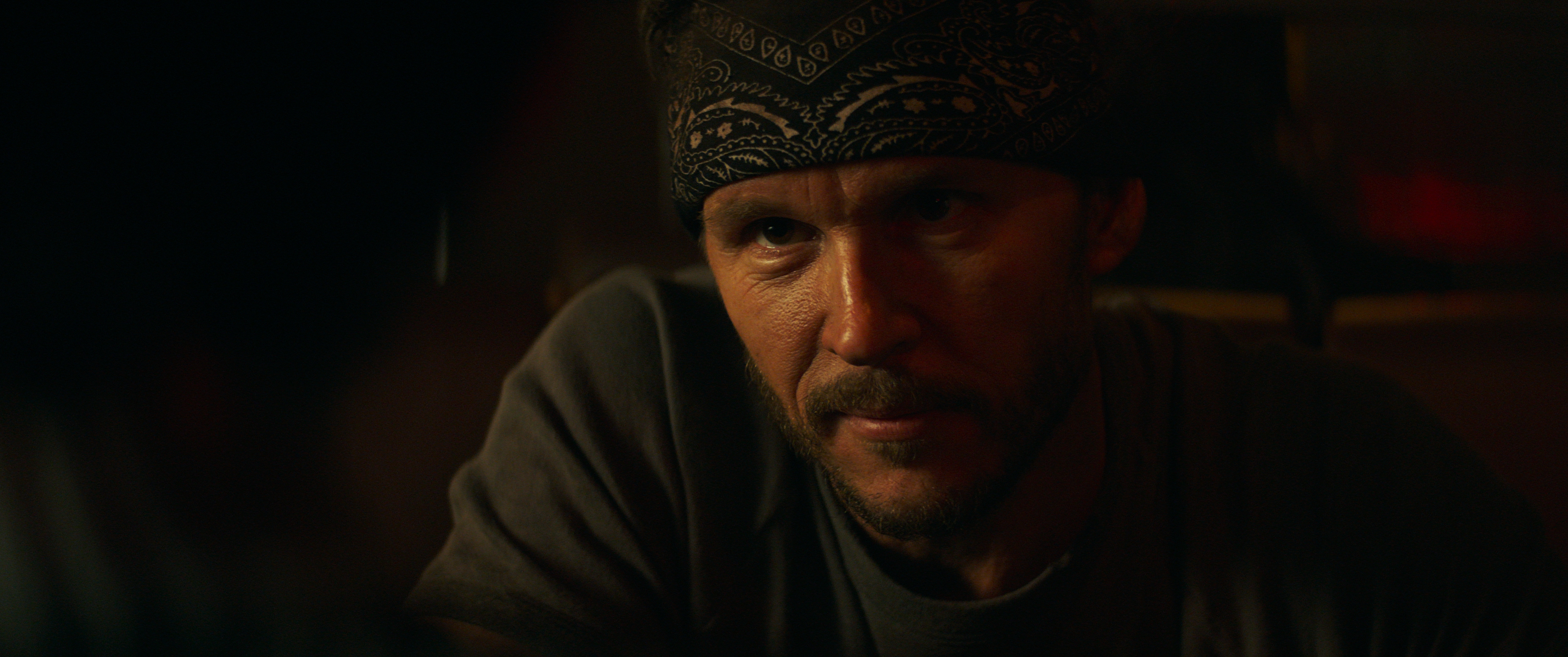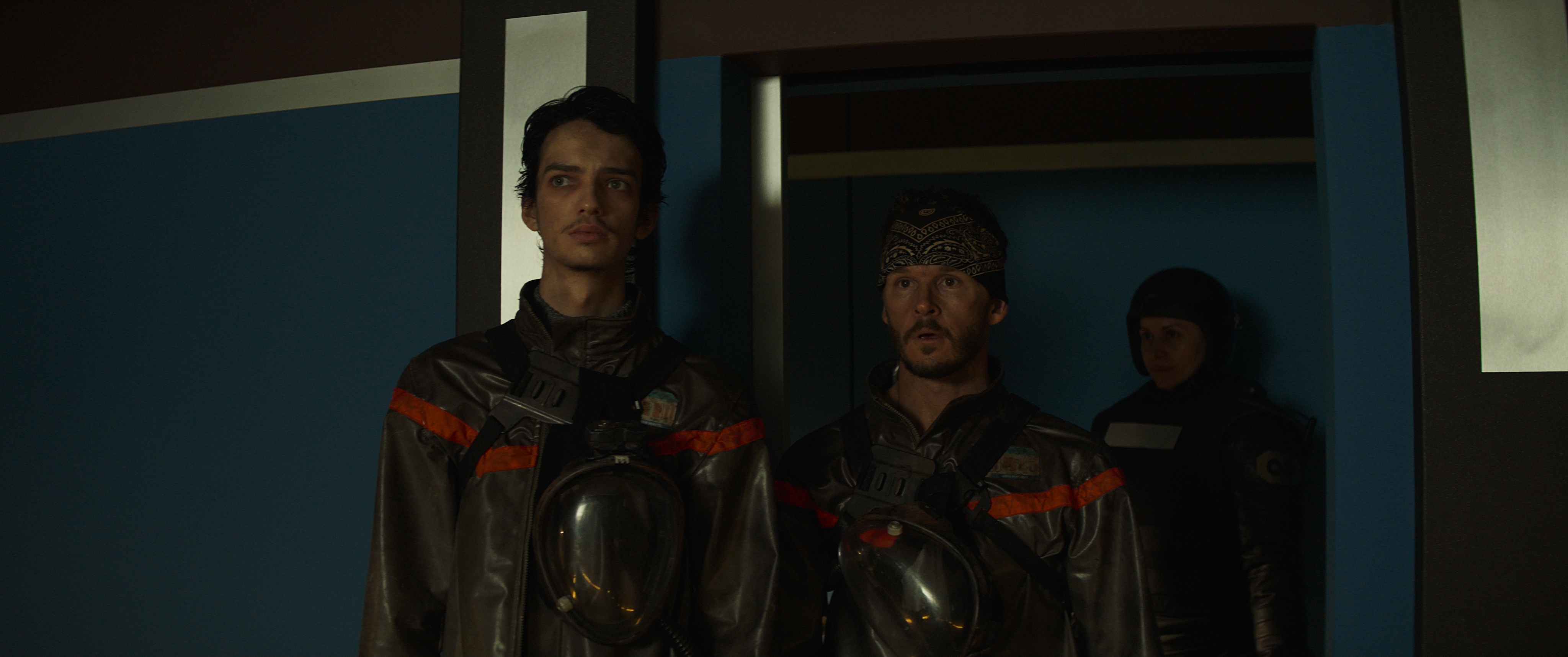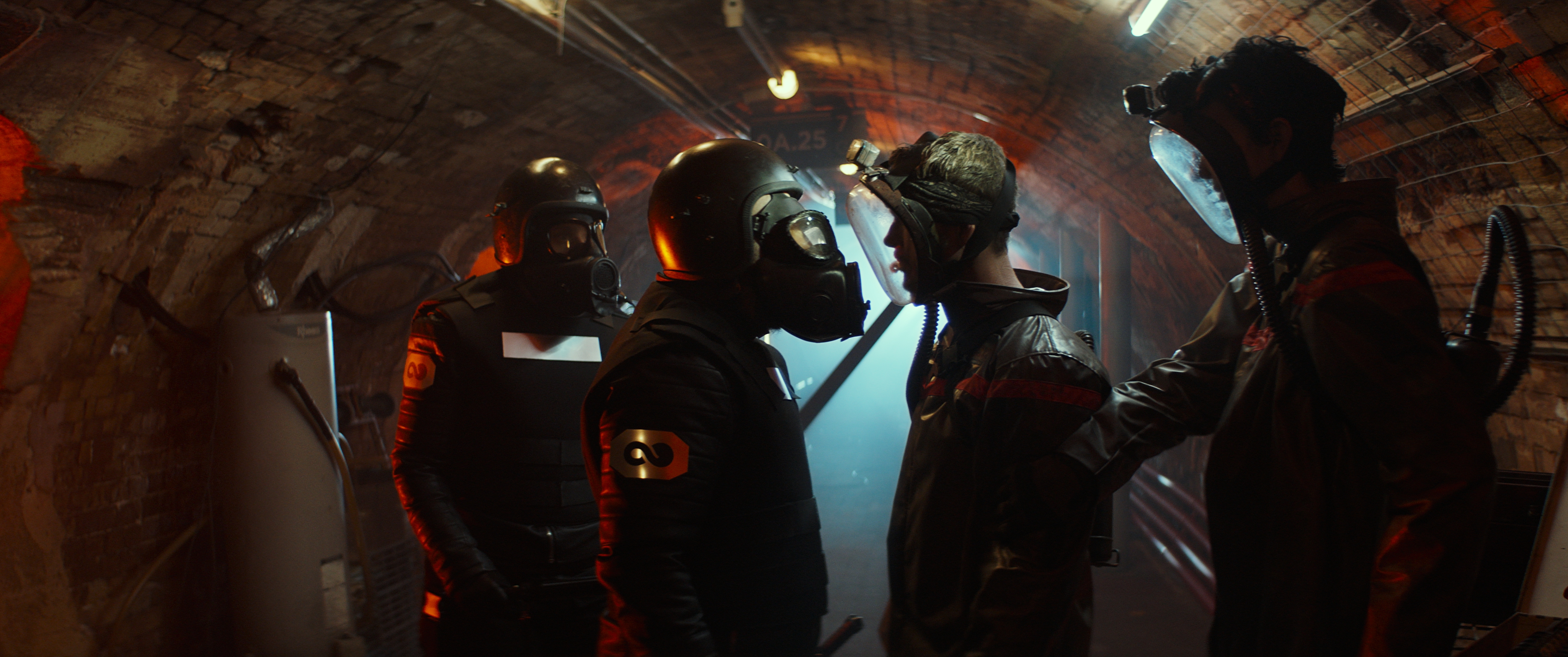Hey folks, Barbarella here still smiling after speaking with Ryan Kwanten. The actor who played Jason Stackhouse on the long-running series TRUE BLOOD, and currently plays Peter in SACRED LIES, may now be seen in the sci-fi film 2067 which came out today in theaters and On Demand and Digital. Written and directed by Seth Larney (TOMBIRUO), 2067 also stars Kodi Smit-McPhee (X-MEN APOCALYPSE, LET ME IN) and melds beautiful visuals with an interesting internal struggle.

Fun fact about me: I love Australia, so I always enjoy meeting and speaking with Australians. I had planned on not gushing about my adoration of the country, but even though Ryan was currently in Los Angeles, I couldn’t stop myself from talking about his homeland.
I love Australia, it's one of my favorite places ever.
“Oh, me too. I mean, it was really only a two-day ticket that drew me to Los Angeles, and I'm still here, sort of twenty years later. I'm fortunate enough to still get work back in Australia, so when I get the opportunity, I take it by the horns, and this was no exception, this movie, 2067. It was a real privilege and treat. There were two places we shot, both Adelaide and Tallebudgera Valley, I'd never worked before or even traveled to before. And if you've seen the movie, you see what a beautiful location Tallebudgera is. And also, for me, as an Australian, Adelaide is a bit of a forgotten city in a weird way, but really has a lot to give.”
How often do you get to go back to Australia?
“I was back earlier this year, and then I hope to get back earlier next year as well. I mean, Australia's still got a two-week quarantine period. We had to quarantine in a hotel, so that puts a little bit of a dampener on getting back there. We'll see, hopefully early next year. Did you say you've been there or you haven't?”
Oh, I've been there three times. I love it.
“Oh, amazing. Are you planning on going back?”
I am. The first time I went, I did a tour up the east coast from Sydney to Cape Tribulation. And then the second time I went, I did Tasmania. I’ve been to Darwin, Melbourne, and Perth. The next time I go, I want to go from Adelaide to Perth and then up to Broome.
“Oh, amazing. Look, I dare say, Barbara, you've seen more of Australia than most Australians have.”
(Laughs) I've been told that.
“Yeah, we almost consider it a rite of passage to get out of dodge, get out of the country and explore what else is out there because we are so isolated. It's been a real treat for me to go home and work in my home country that I really don't know as well as I should.”
Yeah. I recommend exploring out there because it's beautiful. (I could've talked about Australia for another hour or so, but I suspect the film's reps would not have been pleased if we did, so I moved on to discuss the film.) Okay, so how does working on a film like 2067 affect your views on the world in the future?
“Great question. Immensely. Our brilliant commander-in-chief, Seth Larney, who was the writer and director of this, really had not just the vision, but something to say, and it's at a very profound time in our history where science fiction movies are becoming more and more of reality. I think it was important for me, as an artist, to put my hand and my heart behind this man who was willing to put eight to ten years of his life on the line for this movie. That's how long it took him to get it off the ground. To see the results of his labor, of everyone's labor, I'm really, really just dumbfoundingly proud of this movie.”
What do you think our future will be like when we get to 2067?
“Look, I think nature's already telling us that she's a little upset, and I think it's a bit of a call to arms for us, as a civilization and as humans, to kind of take stock in not just who we are, but what effect we have on our environment. So, I don't know, I think in terms of predicting, I think it's going to take change, and I think people, some people, are resistant to changing their ways. But I think it's not until you step out of yourself and realize that there are bigger things at play here and at stake here, that we will begin to move towards a better evolution than where we seem to be headed.”
What intrigued you about the character?
“His duality with Kodi's character, Ethan; they're both the same coin, but they're just different sides of it. There's a real yin-and-yang quality to them, which I think Seth did a great job in really harnessing. And both Kodi and I have very different ways to get to the same place. I think that was a beautiful dichotomy to explore, and I think he's done an incredible job, a sublime job, actually, Kodi did, in playing a leading man and giving him vulnerability, but strength in that vulnerability, and ultimately having a character that can stand up for himself and humankind.”

I'm always somewhat intrigued on how people who don't know each other at all are able to come together and generate an on-screen type of chemistry in such a short amount of time. How do you go about forming those bonds with other cast members quickly so that the onscreen relationship is believable?
“First of all, I think it's the material that attracts the right type of person. And I think you have to leave a little bit of it up to the film and television gods, that they know what they're doing in this. I kind of take it on myself, too, to provide an atmosphere and an environment that's encouraging and inspiring for anyone. I'll stay on set and make sure that everyone's comfortable, talk to the crew, make sure that Kodi's ready to go, whatever it may be. He's very much the same way. You still have to work at creating these environments where you're not afraid to go to these emotional depths and to be supported by a crew that are going to be taking you there."
Do you prefer to take on roles that are similar to you or vastly different, and why?
“I prefer to take on roles that explore characters and modalities of characters that I haven't explored before. I thought it was really interesting in this one, the fact that Jude is a survivor, but he just can't see another way of living. I feel like there's a lot of people in this predicament right now, where they refuse to believe there's another way of existence. It's not until you're shown, and in Jude's case, consistently sort of shown that there is another path, not necessarily a better path, but just another path. It's up to the open mind to choose to know – to keep yourself open to that, as opposed to just believing that your way is the only way.”
Yeah, I think the world would benefit more if more people thought that way these days.
“Yeah. A little bit of empathy goes a long way, I think.”
I agree. What did you love most about working on this film?
"Honestly, it was that. As an artist, I constantly wonder what the hell difference can I make to the world? But I feel like it's in support of dreams like Seth's to make this story a reality. I mean, this is what Seth is calling a “cli-fi,” a climate fiction, but as we've seen recently, it's sort of getting closer to reality. And I think it's his way of putting a stamp on, guys, we have to wake the fuck up because our world's unhappy with us, and unless we kind of change our ways, we're going to meet our demise a lot sooner than mother nature will.”
Was the set as cool in person as it seems on screen?
“Yeah, very much so. Like I said, I've never seen parts of Australia like that. And our location scouts, as well as Seth, did an exquisite job. And it's great because our lead character, Ethan, he's never seen a plant before, let alone a tree, let alone an entire forest. To get a glimpse of what we have in front of us right now, but never really take stock in, to see it again for the first time through this kid's eyes is pretty powerful, I believe. And to take the time to really immerse the audience in that, as opposed to just hurrying through this story, or hurrying onto the next story point, I think was a smart job by Seth.”
How do you spend your time on set when you're not filming?
“I'm usually on set, to be honest, so I very rarely use the trailer, other than to get changed in the morning. I stay on set, eat with the crew, and then go back to set. I just like to stay in the world and like to see how everyone else puts this together. Even after so many years of doing this, I still get just wrapped up in everyone's talent and how many departments have to come together for that small little moment on screen.”

Do you stay in character when you're on set or do you kind of go in and out?
“It depends on the role, but on this one, yeah. I mean, I stayed in character for the most point. I dropped the American accent when I'm not shooting and then put it back on. But outside of that, yeah, there's a certain amount of it. I've been doing it long enough now where I can kind of lose it and come back.”
It always impresses me how many people from Australia (and other countries) can do American accents so well. How long did it take you to master an American accent?
“Not that long. I don't come from an acting background at all, so it was interesting. But what I think I did have as a young kid, because I was such a quiet kid, I would make up for it with my ability to really hone into conversations, into various group dynamics that were happening around me. I think my ability to enjoy other people talking gave me a good ear to really feel the subtleties of the voice, of inflection, of intention. Ultimately, it was telling the truth; that's what I'm trying to do. I'm trying to convince people that whatever character I'm playing is telling the truth. I think people will forgive certain small misgivings in the accent if you're telling the truth. In fact, they won't even hear them. I cannot claim to have a perfect American accent, but I do know that at least, I'm striving for truth.”
Are you an introvert or an extrovert?
“I think I'd be an extroverted introvert. I enjoy my own company, and I'm sort of happy in my own company, but if it's a group kind of a setting, I much prefer to listen to other people talk. I'm still that way. I like one-on-one conversation. I think you can get the ability to, I don't know, to just travel someplace with someone, to really go down a rabbit hole and see where that takes you. I enjoy that.”
If you could go back in time and change one thing, what would it be?
“I would love another day with my gran. That's the first one that came to mind. Yeah, totally. It's not about changing too much, but just one more day, just to watch her. She used to paint as a pastime. Just to see her and sit next to her while she painted her latest landscape, that would be great.”
Wow. Are you a painter? Are you creative at all, outside of acting?
“I think we all are. I really do. I think it's important to bring creativity to anything that we do. I think that's something that's inherently human. And I think that's a really important part of what this story is saying too. To get creative means sometimes disconnecting from our devices and from our comfortabilities and stretching ourselves to a deeper consciousness of sorts."
Although I would have loved speaking with Ryan Kwanten longer, sadly we had to end the call. He stars alongside Kodi Smit-McPhee in the “cli-fi” thriller 2067. If you want to read more about 2067, check back tomorrow for my interview with writer and director Seth Larney. in the meantime, check out the trailer, or just go watch the film.
